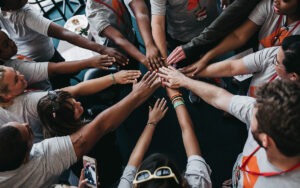
January 3, 2019; Chicago Tribune
Chicago-area manufacturers anticipate “a barrage of baby boomer retirements,” notes Alexia Elejalde-Ruiz in the Chicago Tribune. “And many current owners don’t know who will take over their businesses once they hang up their gloves,” she adds.
NPQ has written about the threat of a wave of small business closures, a phenomenon that has been widely called a silver tsunami. But the situation in Chicago manufacturing seems particularly severe.
Elejalde-Ruiz explains that “industry leaders worry that companies without succession plans might close or get purchased by private equity firms that move them out of the region or pick them apart.” Hundreds of thousands of employees could be affected. Statewide, manufacturing is a $104 billion industry, according to Dan Swinney, executive director of Manufacturing Renaissance.
Researchers from the Great Cities Institute at the University of Illinois at Chicago surveyed 363 family-owned manufacturing companies of 20 to 250 workers, which collectively employed more than 22,000 people. Researchers found that about three-quarters of the companies had owners who were 55 or older. Of those, half had no succession plan. A similar survey in 1989 found that 62 percent had designated successors. But now, only 38 percent do.
To address this challenge, Manufacturing Renaissance is seeking to match retiring manufacturers with entrepreneurs who are interested in keeping the companies local and viable, in a project it is calling the Ownership Conversion Project. Partners include the Chicago Federation of Labor, World Business Chicago, LISC Chicago (LISC stands for “Local Initiatives Support Corporation”), the state treasurer’s office, the Cook County Bureau of Economic Development, and the Safer Foundation, a nonprofit that supports formerly incarcerated people.
“A priority of the initiative,” Elejalde-Ruiz explains, “will be to prepare manufacturing workers to take over the business once the boss retires, as they have industry expertise and a stake in seeing it succeed.” Worker ownership—a strategy that has now become easier due to a federal law passed last August that enables conversions to access federal Small Business Administration partially guaranteed loans—is definitely part of the mix. Swinney notes that identifying companies that are facing succession early “is important because it takes time to prepare workers to become owners, including securing capital.”
Another goal of the initiative is to increase ownership by people of color. At present, in the Illinois manufacturing sector, 99 percent of companies are owned by whites, even as many blacks and Latinxs staff factory floors.
Sign up for our free newsletters
Subscribe to NPQ's newsletters to have our top stories delivered directly to your inbox.
By signing up, you agree to our privacy policy and terms of use, and to receive messages from NPQ and our partners.
The initiative will, as part of its work, provide business analysis of the companies and vetting of potential buyers to ensure a good match. It also will provide training and ongoing support to new owners on how to run a business. Mixed results from an early effort in the 1980s and early 1990s taught Swinney the importance of having ongoing support.
Sources of funds for acquiring businesses will include bank financing and equity from the new owners, as well as seller financing. There also will be an associated impact investing fund.
To date, the Ownership Conversion Project has raised more than $300,000 from the Chicago Community Trust, LISC Chicago, and Cook County. The group hopes to launch this summer and has set the audacious goal of completing 30 acquisitions in the first five years.
One obstacle to succession planning, notes Colin Cosgrove, president of Chicago-based Laystrom Manufacturing, which makes sheet metal fabrications and component parts for industrial equipment, is that selling and buying can be difficult. “There aren’t many places to go for impartial information about the viability of a business,” Cosgrove tells Elejalde-Ruiz. For Cosgrove, one thing that the Ownership Conversion Project would bring to the table is that it would be able to vet companies for potential buyers, while also giving sellers honest assessments about their exit options.
“The people across the table aren’t looking at him or her with dollar signs,” Cosgrove points out. “It’s someone who is saying, ‘How can I support this owner in transition?’”
Cosgrove, 44, began in manufacturing as an entry-level engineer at a South Side factory 20 years ago. He now leads Laystrom, which was founded in 1951 and has 60 employees.
Despite the challenge of succession, Laystrom is bullish about the industry’s long-term prospects. “I think that opportunity still exists in manufacturing. I don’t think we as manufacturers have done a good job at spreading that message across society.”—Steve Dubb













